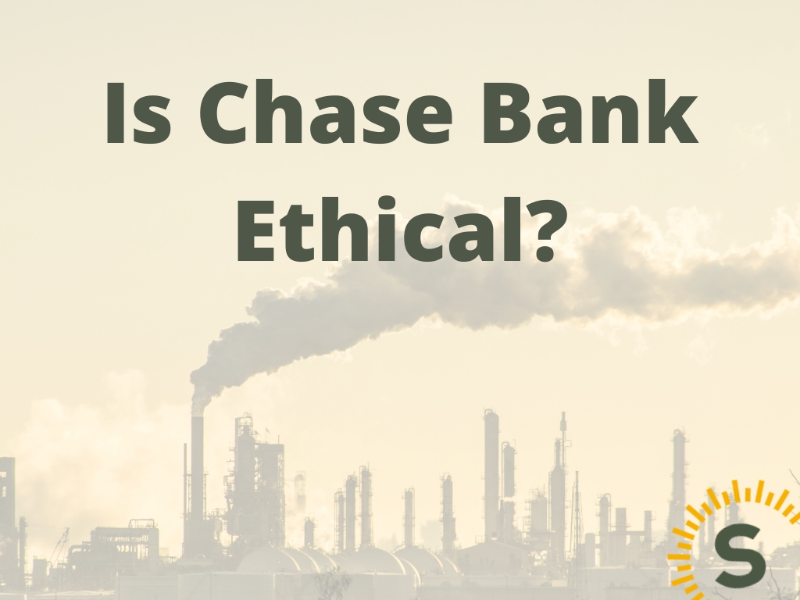
Talking about whether banks are doing the right thing is a big deal nowadays. In the 21st century, people aren't just looking at how much money banks make, but also how they affect the world we live in and nature.
One bank that comes up a lot in these discussions is Chase Bank.
This article will try to answer the question: Is Chase Bank ethical?
To figure this out, we'll look at different parts of what Chase Bank does, like how it promises to do the right thing, how it runs the business, and the arguments people have about whether it's doing the right thing or not.
Chase Bank's ethics are debated. While it excels in some banking aspects, its ties to fossil fuel funding raise concerns about environmental impact. Views vary; ethical judgement hinges on prioritising financial recognition over environmental responsibility.
Before we start talking about Chase Bank in detail, it's important to first get a bigger picture of what ethics means in banking. When we say an 'ethical bank', we mean a bank that tries really hard not to hurt people or nature. Ethical banks promise to do good things for society and the environment. They make sure they don't give money to businesses or projects that make things worse for people, nature, or the world in general.
Chase Bank is connected to a huge banking company called JP Morgan Chase in the US. Even though it's originally from the US, Chase Bank has become quite important in the UK's banking world. It even won the award for being the "Best British Bank" in 2023 at the British Bank Awards. But some people who care a lot about the environment aren't happy about this. They believe that Chase Bank helps to fund fossil fuels, which harm the environment.
One of the big worries about Chase Bank is its link to fossil fuels, which are harmful to the environment. Even though people all over the world are agreeing that we need to stop using fossil fuels, it seems that Chase Bank's main company, JP Morgan Chase, has given a lot of money to the fossil fuel industry. Between 2016 and 2022, they apparently gave an incredible $434 billion to support fossil fuels.
Chase Bank's decision to invest in fossil fuel projects has effects that go beyond just money. It actually hurts the environment in a big way. By giving money to projects that use fossil fuels, they're making the environment worse. This leads to things like climate change getting worse and animals and plants losing their homes. Chase Bank has even been involved in projects that are taking oil and gas out of the Amazon rainforest, which is a really big deal for the environment.
The argument about Chase Bank shows a conflict between two things: the awards it gets for being a good bank and the harm it does to the environment. This situation makes us think about how we decide which banks are the best. Should we care more about how they treat the environment and what's right or wrong? It raises questions about how we judge banks.
Because of these worries, more and more people are saying we should choose banks that are better for the environment. Websites like switchit.green are telling people to think about how their choice of bank affects the environment. If you pick a bank that doesn't give money to fossil fuels, you're using your money to help make the world healthier in the long run.
Thankfully, a new wave of ethical banks is emerging, offering consumers alternatives to traditional banking institutions. Banks like Triodos, for example, are committed to ethical banking practices, investing their customers' money in projects that have a positive social and environmental impact. These banks are leading the way in demonstrating that financial institutions can be profitable while also being socially and environmentally responsible.
To decide if Chase Bank is ethical isn't easy. It's won awards for some banking things, but its actions hurting the environment make people question if it's really ethical. The fact that it supports fossil fuels is a big worry because it goes against taking care of nature.
If Chase Bank is ethical depends on what you think. If you care about nature and being good, you might say Chase Bank isn't doing the right thing. But some people might think more about the awards and how much money it makes.
No matter what, the talk about Chase Bank reminds us how important it is to think about good things in banking. We can change banking by picking banks that match what we believe. If we put our money in banks that do the right thing, we help make banking better. The debate about Chase Bank tells us that ethics in banking isn't just numbers – it's about the world we want and how banks affect it.

Stuart is an expert in Property, Money, Banking & Finance, having worked in retail and investment banking for 10+ years before founding Sunny Avenue. Stuart has spent his career studying finance. He holds qualifications in financial studies, mortgage advice & practice, banking operations, dealing & financial markets, derivatives, securities & investments.





Our website offers information about financial products such as investing, savings, equity release, mortgages, and insurance. None of the information on Sunny Avenue constitutes personal advice. Sunny Avenue does not offer any of these services directly and we only act as a directory service to connect you to the experts. If you require further information to proceed you will need to request advice, for example from the financial advisers listed. If you decide to invest, read the important investment notes provided first, decide how to proceed on your own basis, and remember that investments can go up and down in value, so you could get back less than you put in.
Think carefully before securing debts against your home. A mortgage is a loan secured on your home, which you could lose if you do not keep up your mortgage payments. Check that any mortgage will meet your needs if you want to move or sell your home or you want your family to inherit it. If you are in any doubt, seek independent advice.